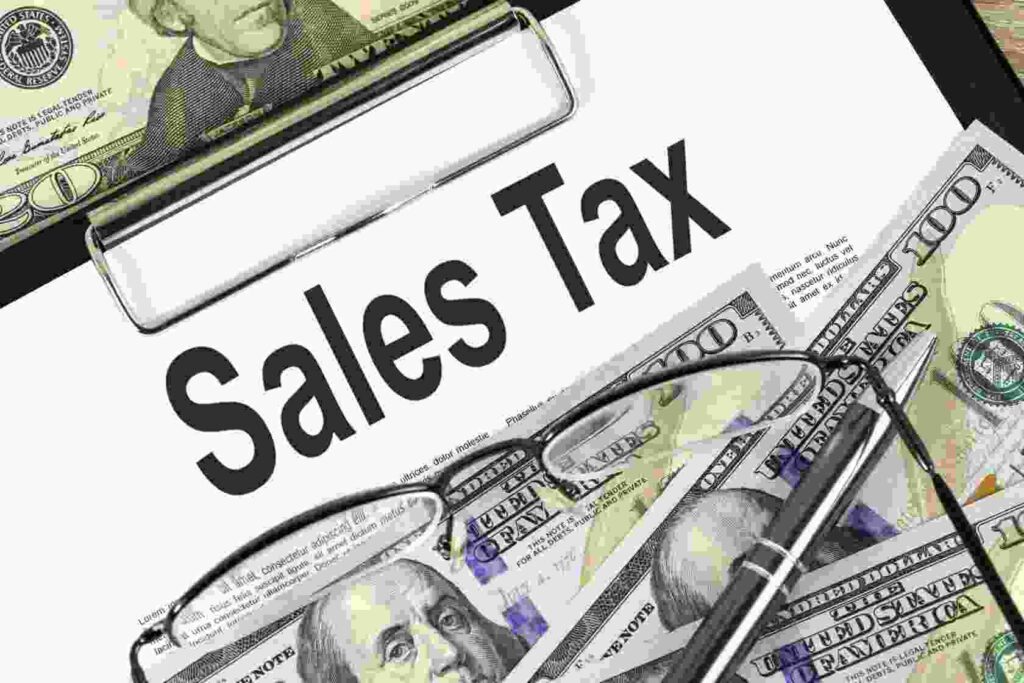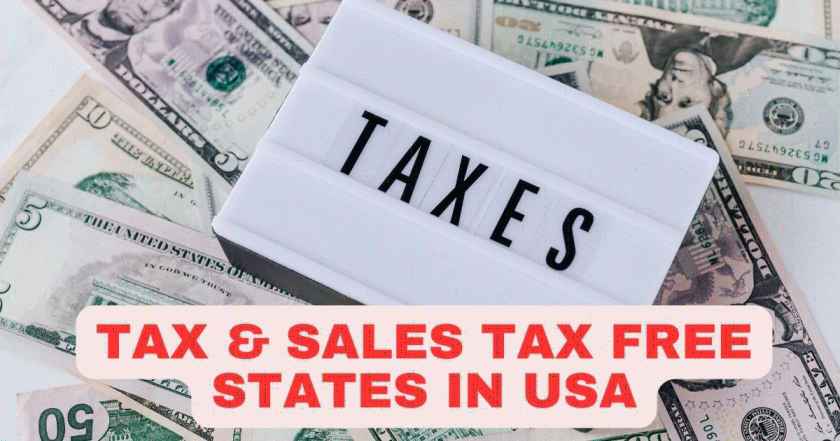Taxation is an essential aspect of any government’s revenue system, and it varies among different states in the United States. While most states levy taxes on various sources of income, some states have chosen to forgo the imposition of certain taxes altogether. These states, often referred to as tax-free states, do not impose a state income tax on individuals or businesses.
Tax Free States USA
In 2024, Tax-free states in the United States, such as Alaska, Florida, Nevada, South Dakota, Texas, Washington, and Wyoming, do not impose a state income tax on individuals or businesses. While this can provide significant tax advantages, it’s essential to consider other forms of taxation and consult with professionals to navigate the broader tax landscape effectively. Understanding the specific tax policies of each state and seeking expert advice will help individuals and businesses make informed decisions regarding their financial planning and tax obligations.
Which are the Tax Free US States?
- Alaska: No state income tax, but local sales taxes and property taxes may apply.
- Florida: No state income tax; relies on sales tax, property tax, and other fees.
- Nevada: No state income tax; revenue generated through sales tax and gambling-related taxes.
- South Dakota: No state income tax; revenue sourced from sales tax, property tax, and other avenues.
- Texas: No state income tax; revenue generated through sales tax, property tax, and various fees.
- Washington: No state income tax; revenue sourced from sales tax, property tax, and specific industry taxes.
- Wyoming: No state income tax; revenue generated through sales tax, property tax, and taxes related to natural resources.
Let’s explore these tax-free states in detail and delve into their tax policies.
- Alaska: Alaska is renowned for being a tax-free state when it comes to state income tax. This means that individuals and businesses residing in Alaska are not subject to state-level income tax on their earnings. The absence of an income tax is partially due to Alaska’s significant oil wealth, which provides substantial revenue for the state. However, it is important to note that Alaska still imposes other taxes, such as local sales taxes and property taxes, which contribute to funding state operations.
- Florida: Florida is another state that does not impose a state income tax on its residents. Individuals and businesses in Florida are not required to pay state income tax on their earnings. Instead, Florida relies on alternative revenue sources, such as sales tax, property tax, and other fees, to fund state operations. The absence of an income tax in Florida has made it an attractive destination for retirees and individuals seeking to minimize their tax burden.
- Nevada: Nevada is widely known for its tax-free status in terms of state income tax. Residents of Nevada are not subjected to state-level income tax on their earnings. The state generates a substantial portion of its revenue through other means, particularly through sales tax and taxes associated with the gambling industry. Nevada’s lack of state income tax has contributed to its popularity as a destination for businesses and individuals seeking to maximize their income.
- South Dakota: South Dakota is considered a tax-friendly state due to its absence of state income tax. Individuals and businesses residing in South Dakota are not required to pay state income tax on their earnings. The state’s revenue primarily comes from sales tax, property tax, and other sources. South Dakota’s tax policies have made it an attractive location for businesses and individuals looking to enjoy tax benefits.
- Texas: Texas is famous for its tax-free status in terms of state income tax. Individuals and businesses residing in Texas do not have to pay state income tax on their earnings. Texas generates revenue through other means, such as sales tax, property tax, and various fees. The absence of state income tax has contributed to Texas’ reputation as a business-friendly state and has attracted many individuals and corporations to establish a presence there.
- Washington: Washington is another state that does not impose a state income tax on its residents. This means that individuals and businesses in Washington are not subject to state-level income tax on their earnings. Instead, the state relies on other revenue sources, such as sales tax, property tax, and taxes related to specific industries. Washington’s lack of state income tax has made it an appealing destination for businesses and individuals seeking to minimize their tax burden.
- Wyoming: Wyoming is known for being a tax-free state when it comes to state income tax. Residents of Wyoming are not required to pay state income tax on their earnings. The state generates revenue through various means, including sales tax, property tax, and taxes related to natural resources. Wyoming’s tax-friendly policies have made it an attractive destination for businesses and individuals seeking favorable tax treatment.
It’s important to note that while these states do not levy a state income tax, they may still impose other taxes, such as sales tax, property tax, corporate tax, or excise taxes. Each state has its own tax structure and regulations, and it’s advisable to consult the current tax laws or seek guidance from tax professionals or official sources for specific details.
Tax-free states offer advantages for individuals and businesses, as they allow for greater retention of income. Residents of these states can enjoy higher take-home pay, which can have a positive impact on their overall financial well-being. Additionally, businesses operating in tax-free states can benefit from reduced tax liabilities, potentially freeing up resources for expansion, investment, and job creation.
The absence of state income tax in tax-free states has attracted individuals and businesses from high-tax states, who may choose to relocate in order to reduce their tax burden. This migration can lead to economic growth and increased competitiveness for tax-free states, as well as potential population growth and job opportunities.
However, it’s important to consider that the absence of a state income tax in these states does not mean individuals and businesses are completely exempt from all taxes. Other forms of taxation, such as sales tax, property tax, and federal income tax, still apply. It’s crucial to understand the overall tax landscape and consult with tax professionals to ensure compliance with all applicable tax obligations.
Moreover, tax policies can change over time as states adapt to shifting economic and fiscal priorities. Therefore, it’s advisable to stay updated on tax laws and regulations in tax-free states or consult with professionals for the most accurate and current information.

Sales Tax Free States in USA
Here are the sales tax-free states in the USA presented in points:
- Alaska: No statewide sales tax, but some local municipalities may impose local sales taxes.
- Delaware: No statewide sales tax.
- Montana: No statewide sales tax, but local jurisdictions may impose local option sales tax.
- New Hampshire: No statewide sales tax, but there is a tax on prepared meals and lodging.
- Oregon: No statewide sales tax.
Sales tax is a form of consumption tax imposed on the sale of goods and services. While most states in the United States levy sales tax, there are a handful of states that do not impose a statewide sales tax. These sales tax-free states offer a unique advantage to consumers and businesses, as they allow for tax savings on purchases. Let’s explore these sales tax-free states in more detail.
- Alaska: Alaska is one of the few states that do not impose a statewide sales tax. Instead, the state relies on revenue from other sources, such as income taxes, corporate taxes, and oil revenues. However, it’s important to note that some local municipalities in Alaska may impose local sales taxes. These local taxes can vary, so it’s advisable to check the specific tax rates in the area where the purchase is being made.
- Delaware: Delaware is known for being a sales tax-free state. It does not impose a statewide sales tax on purchases. This has made Delaware a popular destination for shoppers, particularly for large purchases such as appliances or electronics. The absence of sales tax can result in significant savings for consumers.
- Montana: Montana is another state that does not impose a statewide sales tax. While the state itself does not levy a sales tax, some local jurisdictions within Montana may impose a local option sales tax. It’s important to be aware of the local tax rates in the specific area where the purchase is made.
- New Hampshire: New Hampshire is a sales tax-free state. It does not impose a statewide sales tax on purchases. However, the state does have a tax on prepared meals and lodging. This means that while most goods and services are not subject to sales tax, dining out or staying in hotels may incur taxes.
- Oregon: Oregon is known for its lack of a statewide sales tax. Consumers in Oregon do not have to pay sales tax on most purchases. This has made the state a popular destination for cross-border shopping, particularly for residents of neighboring states that have higher sales tax rates.
The absence of a statewide sales tax in these states can result in significant savings for consumers. It allows individuals to stretch their purchasing power and keep more money in their pockets. Additionally, businesses in sales tax-free states may enjoy certain advantages, such as increased consumer spending and potential competitiveness against businesses in neighboring states with higher tax rates.
It’s important to note that while these states do not impose a statewide sales tax, they may still have other taxes in place, such as income tax, property tax, or local taxes. These taxes contribute to the funding of state operations and services. Additionally, some states may have specific taxes on certain goods or services, even if they don’t have a general sales tax.
It’s crucial to stay updated on tax laws and regulations, as they can change over time. State governments may introduce new taxes or modify existing ones based on their fiscal needs and priorities. Therefore, it’s advisable to consult the current tax regulations or seek advice from tax professionals for the most accurate and up-to-date information.








